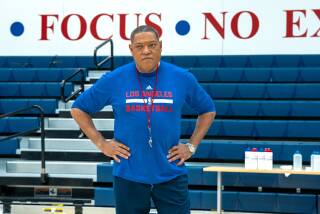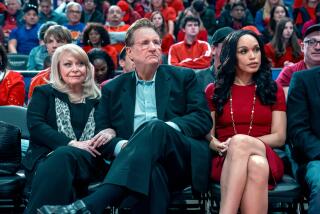Clippers Failed to Seek Information on Johnson Through NBA Office
- Share via
Clipper executives, who have said they’d have thought twice about acquiring Marques Johnson from Milwaukee in a six-player trade last September if they had known of Johnson’s drug history, could have learned about it from the National Basketball Assn. office had they had followed a standard procedure, it was learned Thursday.
The NBA has a procedure in which a team involved in trade negotiations can check a player’s file to find out, among other things, if the player has received treatment at a drug rehabilitation center. A team only needs permission from the other team involved to gain access to the information.
Had the Clippers exercised that option, sources said, they would have known that Johnson had been hospitalized at St. Mary’s Rehabilitation Center in Minneapolis in 1983.
Jack Joyce, the NBA director of security who is in charge of players’ files, could not be reached Thursday. But General Counsel Gary Bettman said: “The league does not disclose to the press what information it does or doesn’t give to its member teams.”
After the Clippers learned of Johnson’s hospitalization in a Feb. 9 story in The Times, President Alan Rothenberg and General Manager Carl Scheer said they had investigated rumors and were “sufficiently satisfied” that Johnson did not have a drug problem.
They also said that the Bucks were obligated to inform them of Johnson’s treatment before completing the trade, which sent All-Star forward Terry Cummings and guards Craig Hodges and Ricky Pierce to Milwaukee for Johnson, swingman Junior Bridgeman and forward Harvey Catchings. Fitzgerald, who was Bucks president when the trade was made, said Thursday that he did not deceive the Clippers by not revealing facts about Johnson’s stay at St. Mary’s. He also said he would have given the Clippers permission to check NBA files had they asked.
“Sure, I would have told them they could check it out with the league,” Fitzgerald said from his Palm Springs home. “They didn’t ask me. I believe I dealt straight up with the Clippers. That avenue (the NBA procedure) was available to them. They just had to look.”
Rothenberg, responding to Fitzgerald’s comments, said Thursday that he expected Fitzgerald to pass along the information in negotiations.
“Why should we ask (to check the files) when they tell us there’s no problem with Marques and drugs?” Rothenberg said. “I thought he (Fitzgerald) was an honorable man. I had no reason to believe Milwaukee was lying to me. So, why ask the league?”
Fitzgerald and other Bucks executives maintain that Rothenberg never asked him about Johnson during trade negotiations. But Daniel Neviaser, a member of the Bucks’ board of directors, confirmed Tuesday that the Bucks “tried to hide” the fact that Johnson had a drug problem in 1983.
Responding to Fitzgerald statement that the Clippers never asked about Johnson’s drug history during negotiations, Rothenberg said: “He’s a double liar.”
Scheer has said that although he didn’t directly ask Bucks Coach Don Nelson about Johnson, he investigated rumors around the NBA and was “sufficiently satisfied” that Johnson did not have a drug problem.
In the Feb. 9 story in The Times, Scheer said: “We checked substantiated sources, not rumored ones. . . . We called different people associated with Marques, past and present teammates.”
Thursday, Scheer reiterated that he “called people who knew (Johnson) currently and knew what was going on.” But did Scheer consider asking permission to check the league’s files?
“I didn’t bother to do that,” he said. “It (the trade) was done in the space of 48 hours. It was very hectic and not like a normal trade. The Bucks gave us a deadline (the start of training camp), and we had to complete the trade before that.”
Asked if he would have checked with the league if there wasn’t a time restriction on the trade, Scheer said: “Probably would have. Sure.”
Rothenberg disagreed with Scheer on that point.
“There was time to think about it (consulting the league),” Rothenberg said. “If we had any reason to believe (Johnson had a drug history), we would have told the Bucks to forget the deadline. They told us there was no problem.”
Scheer, who has been a professional basketball general manager for 14 years in three cities, maintains the Bucks had an obligation to tell the Clippers, even if they were never asked about it.
“The question lingers on: What obligation did the Bucks have to tell us?” Scheer said. “If I have a guy who had a knee injury and surgery in July of 1983 but it’s healed, I’d tell the team that. I’ve always volunteered to tell teams of injuries. You should make a full disclosure. I’m not saying that’s ethically or legally binding. It seems to me that Nelson could have told me when we talked.”
After Neviaser’s comments Tuesday about the Bucks trying to hide Johnson’s hospital stay, Rothenberg said Fitzgerald privately told him that the Bucks were aware of it.
“It is nothing we don’t already know,” said Rothenberg Wednesday night, in response to Neviaser’s remarks. “After the story broke, Fitzgerald admitted it to me.”
Rothenberg said again Thursday that the Clippers haven’t decided if they will take action against the Bucks. “We’ll cross that bridge when we come to it--if we come to it,” he said. “Our position is set. They were obligated to tell us.”
Bettman said that NBA Commissioner David Stern would serve as an arbitrator if the Clippers file a complaint against the Bucks.
“Generally,” Bettman said, “the NBA constitution says that in the event there is a dispute between teams--and I’m not saying there is in this case--the commissioner has full, complete and final authority.”
Fitzgerald said that he understands why the Clippers are upset. Cummings is averaging 24.1 points a game for the first-place Bucks. Johnson, a former UCLA star who was the Clippers’ main marketing tool in their first season in Los Angeles, is averaging 16.4 points, lowest in his career.
“Everything is going wrong for them (the Clippers) this year,” Fitzgerald said. “I just don’t want to add to their discomfort. This was their big chance for a new start in a new city and it hasn’t worked out for them.”
Clipper Notes
Guard Franklin Edwards’ 10-day contract expired after Wednesday night’s game against Utah. The Clippers want to sign Edwards, a free agent who played with Philadelphia last season, to an offer sheet for the rest of the season. But the 76ers have the right of first refusal. Clipper General Manager Carl Scheer said Philadelphia is asking for two second-round draft picks to waive their claim on Edwards. “I’ve refused to give them that,” Scheer said. “Franklin’s attorney (Ron Grinker) and the player’s association are saying that Philadelphia does not have the right of first refusal. We should have this straightened out by Friday.” Edwards has played well backing up Norm Nixon and figures to be in good position to earn a roster position next season.
More to Read
Get our high school sports newsletter
Prep Rally is devoted to the SoCal high school sports experience, bringing you scores, stories and a behind-the-scenes look at what makes prep sports so popular.
You may occasionally receive promotional content from the Los Angeles Times.






